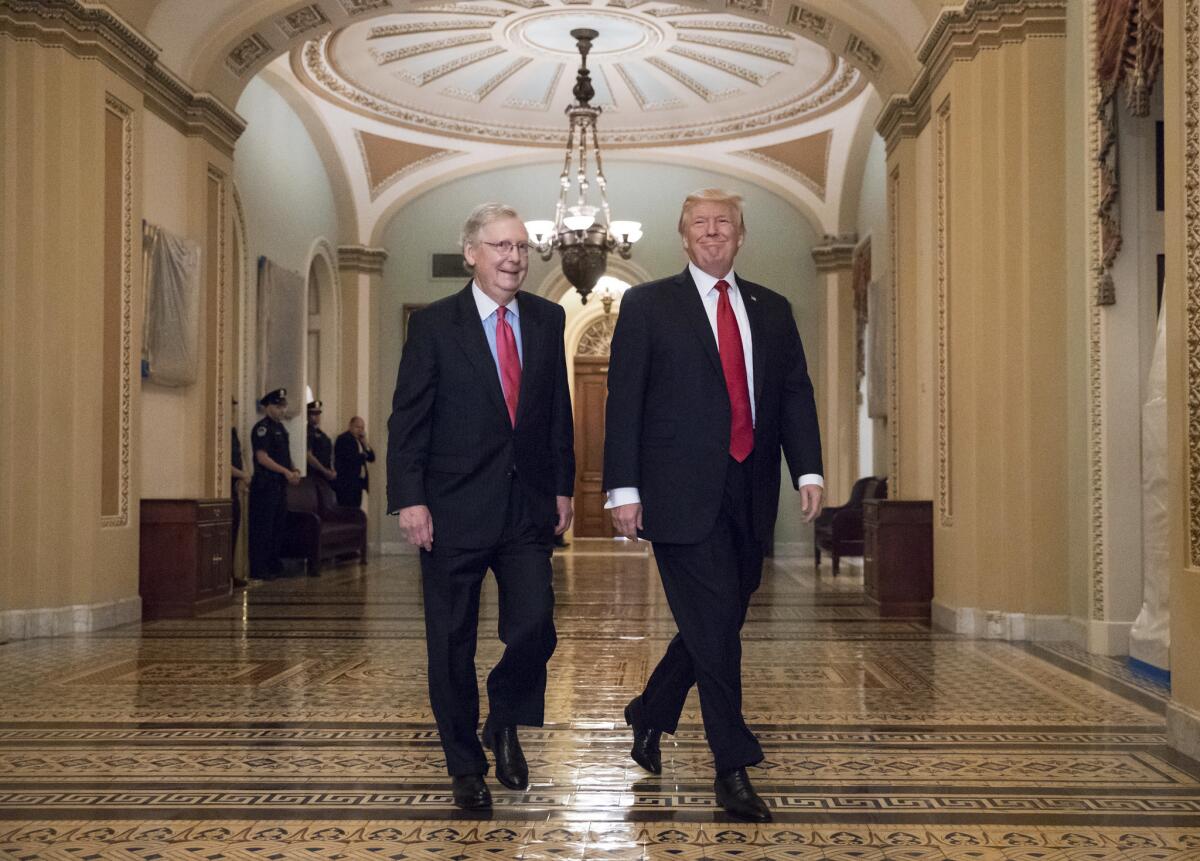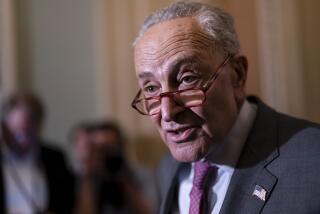Editorial: A flurry of Trump tweets later, your chance of getting a stimulus check is still dead

- Share via
Over the course of the day Tuesday, President Trump made a series of dramatic and seemingly contradictory pronouncements on Twitter about whether the federal government should provide any further help to the pandemic-scarred economy.
First he said he was cutting off negotiations with congressional Democrats over an aid package “until after the election when, immediately after I win, we will pass a major Stimulus Bill that focuses on hardworking Americans and Small Business.” This vote-for-me-if-you-want-the-stimulus-bill-to-live tweet caused the stock market to plummet and drew rebukes from lawmakers in both parties who support providing more relief.
A few hours later, however, Trump approvingly retweeted a CNBC story about Federal Reserve Chairman Jerome Powell telling a gathering of economists that Congress and the White House have to do more to boost the economy. Powell warned of a potential downward spiral that could deepen the recession and exacerbate disparities in the economy, which would be “tragic” — a note of caution that was unusually blunt for a Fed chair.
After that, and mixed in with a flurry of tweets about the special counsel’s investigation into Russian meddling in the 2016 election, Trump called on Congress to pass bills to bail out the airline industry, provide $135 billion in additional help to struggling businesses and send $1,200 “Stimulus Checks” to U.S. households.
The president’s LeBron James-caliber spin moves don’t make it any easier for lawmakers — mainly Democrats, but also some Republicans — who are heeding Powell’s warnings and trying to help millions of unemployed Americans, struggling businesses and cash-starved state and local governments. But the reality is that Trump isn’t, and hasn’t been, the main obstacle. It’s been the yawning gap between Senate Republicans who don’t support another expensive effort — especially not for state and local governments — and Democrats who don’t think a half measure will be enough.
According to the Washington Post, Trump pulled the plug on talks between House Speaker Nancy Pelosi (D-San Francisco) and Treasury Secretary Steven T. Mnuchin shortly after Senate Majority Leader Mitch McConnell (R-Ky.) told Trump that Pelosi “might be stringing him along.” Yet it was clear from the start that McConnell wasn’t willing to bring a bill to the Senate floor that House Democrats could support, because most of his Republican colleagues were willing to spend only a fraction of what Democrats considered to be the bare minimum. McConnell also was insisting on liability waivers that would have left consumers and workers with no recourse if they were harmed by a business that negligently handled its COVID-19 risks.
GOP critics say Democrats are just trying to make Trump look bad instead of genuinely working to help struggling Americans. But Senate Republicans want to ignore a broad array of problems that the pandemic has caused; Democrats, meanwhile, fear that Republicans may be even less willing to act after the election. That’s a reasonable fear, given how Republicans staunchly resisted efforts by Democrats and the Obama administration to provide more stimulus after the 2010 election, even as the Great Recession dragged on.
The most frustrating thing about the situation is that there was a clear path to a deal. Republicans and Democrats in the House’s centrist Problem Solvers Caucus laid out a sensible framework in mid-September for a bill that addressed all the major issues — including the challenges faced by idled workers, businesses, schools, state and local governments, election officials and healthcare providers — while seeking a middle ground on spending. The distance between that proposal and the last relief proposal passed by the House, the revised HEROES Act, was not so great.
Now is not the time for Congress and the president to be cherry-picking which problems to address. As Fed Chairman Powell noted Tuesday, the risk of providing too little support for the economy now far outweighs the consequences of providing too much. If only more Senate Republicans would take that message to heart.
More to Read
A cure for the common opinion
Get thought-provoking perspectives with our weekly newsletter.
You may occasionally receive promotional content from the Los Angeles Times.










